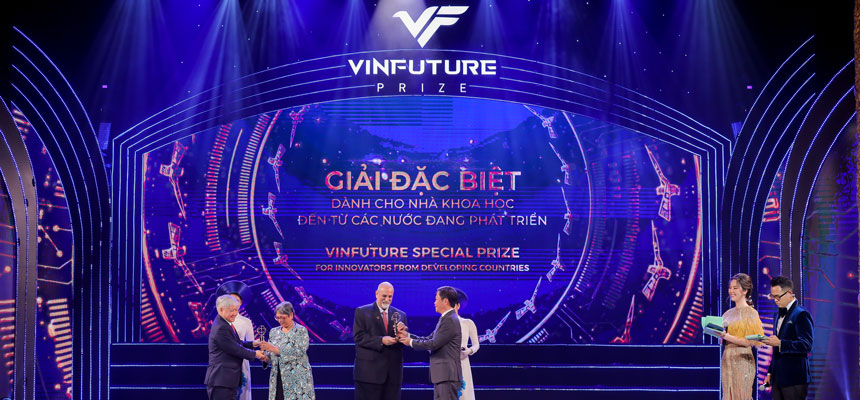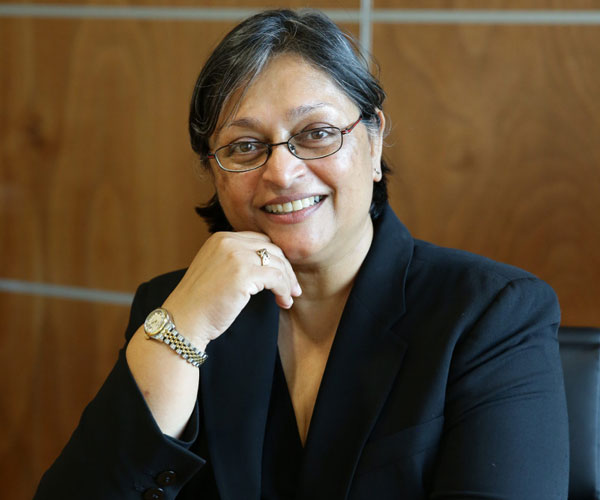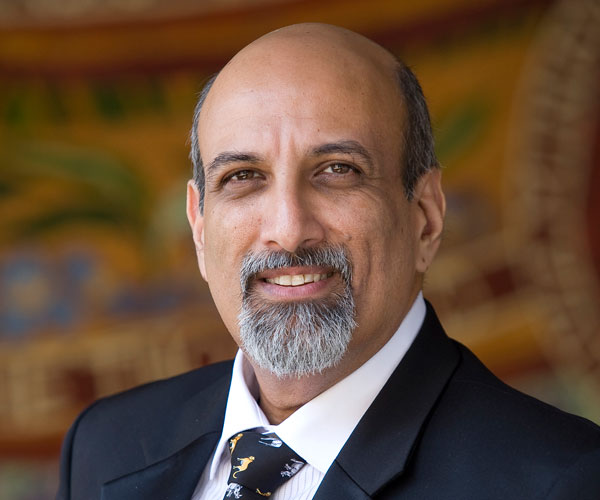
Professors Quarraisha Abdool Karim and Salim Abdool Karim are the recipients of the 2021 VinFuture Prize in the special category of developing country innovators. The announcement was given at the inaugural VinFuture Prize Award Ceremony, on 20 January, at the Hanoi Opera House in Hanoi, Viet Nam.
Quarraisha and Salim Abdool Karim are partners in life and at work, and gained an international reputation for their commitment to understanding the evolution of the human immunodeficiency virus (HIV) infections in South Africa and finding effective treatments for AIDS, particularly in the poorest countries.
The VinFuture Prize is a newly established global science and technology prize administered by the VinFuture Prize Foundation in Hanoi. In addition to a grand prize of $3 million, which acknowledges groundbreaking scientific innovations with a potential positive impact in the lives of millions of people worldwide, the Foundation bestows three special prizes of $500,000 each, awarded to developing country innovators, female innovators, and innovators with outstanding achievements in emerging fields. Quarraisha and Salim Abdool Karim were awarded as developing country innovators and selected out of nearly 600 nominees from 60 countries.
The names of Quarraisha and Salim Abdool Karim are inextricably linked to the global fight against HIV. In 2010, the two scientists pioneered a clinical trial that proved how antiretroviral drugs, such as the tenofovir gel, are effective in preventing infections from the virus.
Quarraisha Abdool Karim, a TWAS Fellow since 2015 and the winner of the 2014 TWAS-Lenovo Science Prize for her life-saving research, is the co-founder and Associate Scientific Director of the Centre for the Aids Programme of Research in South Africa (CAPRISA).
She holds professorships in Clinical Epidemiology at the Columbia University Mailman School of Public Health, in the United States, and in Public Health at the Nelson R Mandela School of Medicine, at the University of KwaZulu-Natal, in South Africa.
She has been dedicating most of her career to the prevention of HIV infections in women and adolescent girls, particularly in Sub-Saharan Africa. According to a recent paper, about eight million of South Africa’s 60 million population live with HIV, roughly a fifth of all people living with HIV globally.
Women are a key element in the AIDS pandemic, because of the risk posed by non-protected sexual encounters that may turn them into unaware vehicles of transmission, in particular when delivering a baby. Protecting women means breaking a vicious infective cycle, thus protecting a wider part of the population.
In 2010, Professor Quarraisha Abdool Karim led a pioneering study that confirmed the effectiveness and safety of a vaginal gel formulation (tenofovir) that prevents HIV acquisition in women. The gel proved to be an important tool, as it protected from contagion a high percentage of women who adhered strictly to the therapy.
"This award recognizes CAPRISA research dedicated to developing new prevention approaches to AIDS, tuberculosis and Covid-19, and is made possible through the dedication and commitment to excellence by a team of over 200 researchers in South Africa, with collaborators from five continents across the globe, numerous local and international donors and thousands of volunteers who have participated in our studies over the last 33 years," she said. "We deeply appreciate the critical role that TWAS has played over the years in profiling and recognizing our research."
Salim Abdool Karim, Director of CAPRISA and a Professor of Global Health at Columbia University in New York City, is also a TWAS Fellow since 2009. His scientific contributions to HIV prevention and therapy gained him an international reputation and many awards. In 2008, he received TWAS Prize in Medical Sciences, and in 2015, he was awarded the most prestigious scientific award in Africa: the African Union’s “Kwame Nkrumah Continental Scientific Award”. In 2020, he received the John Maddox Prize for his work defending science during both the HIV and Covid-19 pandemics, and actively tackling misinformation.
He chairs the Joint United Nations Programme on HIV/AIDS (UNAIDS) Scientific Expert Panel, the World Health Organization (WHO) HIV Strategic Advisory Committee, and serves on the WHO HIV/TB Task Force.
He is also a member of the Africa Taskforce for Novel Coronavirus, the Lancet COVID-19 Commission, and the African Commission on Covid-19. During the most critical phases of the pandemic, in 2020 and 2021, he was an active and authoritative voice, advising the scientific community and the general public about the best measures to lower the risk of infection.
"The VinFuture Award for scientists in developing countries is a beacon for many scientists in the developing world, who toil away each day in their laboratories, clinics, and libraries, as it recognizes that scientific excellence is achievable even in the midst of adversity," he maintained. "This award complements the vision and goal of TWAS in terms of advancing and amplifying the excellency in science in developing countries for the betterment of humanity."
Read more about CAPRISA
Read more about the VinFuture Prize
Cristina Serra

